Sand artist, Kseniya Simonova, moved audiences to tears as she won Ukraine’s Got Talent with this performance of a series of pictures drawn on an illuminated sand table showing how ordinary people were affected by the German invasion during World War II. Telegraph.co.uk has a text description of the performance.
That Whole Goolge Online Book Thing
Still trying to understand the whole Google-publisher-author-settlement deal? Carol Kellog’s LA Times blog on Jacket Copy gives a nice overview. As of now, the whole deal is on hold.
Glimmer Train Contest Winners
Glimmer Train has just chosen the winning stories for their July Very Short Fiction Award. This twice yearly competition is open to all writers for stories on any theme, with a word count not exceeding 3000. Their monthly submission calendar may be viewed here.
 First place: J.P. Lacrampe (pictured) of San Francisco, CA, wins $1200 for “Farmers’ Market.” His story will be published in the Winter 2011 issue of Glimmer Train Stories, out in November 2010.
First place: J.P. Lacrampe (pictured) of San Francisco, CA, wins $1200 for “Farmers’ Market.” His story will be published in the Winter 2011 issue of Glimmer Train Stories, out in November 2010.
Second place: Stephanie Reents of Providence, RI, wins $500 for “The Indefinite Article Is a Different Story.”
Third place: James Scoles of Carbondale, IL, wins $300 for “To Cook an Egg Gently.”
A PDF of the Top 25 winners can be found here.
Deadlines soon approaching!
Best Start: September 30
This competition is held quarterly and is open only to writers whose fiction has not appeared in a print publication with a circulation over 3000. Each submission should be an engaging, coherent narrative, but does not need to be a complete story, just an important part of a story in progress. Word count: under 1000. Click here for complete guidelines.
Fiction Open: September 30
This competition is held quarterly and is open to all writers for stories with a word count range between 2000-20,000. No theme restrictions. Click here for complete guidelines.
Layout Designer Wanted
The Cartier Street Review, a three-year-old literary magazine, is seeking someone creative who knows about poetry layout to do issue layouts only. This is an unpaid position combined with desirability of editorial responsibility based on staff choices. Send letter of interest to: Violetwrites-at-nyc.rr-dot-com
Power of the People – Philly Keeps Libraries Open!
Thanks Mark Stratton for this update on the Philly Free Library.
Happy Punctuation Day!
That’s right – September 24 is National Punctuation Day.
UC Press Online Book Sale
U of Cali Press: Save up to 70% when you use this code: 10M9352 through October 31, 2009.
Free Poetry Books
As a teacher in a rural college, I am faced with students whose daily financial struggles affect their ability to attend and be fully prepared for classes. Even more so now, living in a state with the highest unemployment, I have students who cannot afford to buy textbooks, or who will miss class because they can’t afford the gas it will take to get back and forth to campus.
I have been using online lit for a long time – online lit mags as well as print publications with online supplements. But I am always appreciative to find publishers who offer completely free online books. I have posted on “free books” before, and was reminded of the public library as a resource, but in this case, I’m talking about being able to access 15-25 copies of a book – for free. I certainly don’t expect all publishers to offer this – those who do have their own philosophies of open access.
What it allows me to do is put collections of poetry into the hands of students who otherwise might never “own” such a book. And, oddly enough, I’ve found students treat these books with a greater respect – even if they don’t “like” them – than when I was having them purchase such books. I’ve never found a copy of a free book in the trash, whereas I have the ones they’ve paid for – go figure.
Here are several sources I have found for qaulity, free books and some of their authors – and what I mean are those that can be accessed and printed in book form (PDF or like platform), not formatted for web reading only. Something students/readers can print and carry with them.
Certainly, if you know of other such sources, please let me know.
Beard of Bees
Constantin Acosmei, Gregory Fraser, Jacques Roubaud, Rae Armantrout, H. Patrick Glumm, Morten S
Right Hand Pointing
Here’s a byline I can get behind: right hand pointing – “an online literary journal of very brief pieces for smart people with short attention spans.” Finally. I also appreciate the Submissions Slide Show and Hate Mail page.
Contest Winners: In the Grove
In the Grove,the California Poets & Writers Annual, announces that with its summer issue, the publication will now be available online. Editor Lee Herrick explains: “A number of factors have made it appealing—the lower cost, the wider distribution, and the increased legitimacy of online magazines.”
This issue includes the 2008 William Saroyan Centennial Prize:
Creative Nonfiction Winners
First Prize: “Learning the Alphabet,” by Bethany E. Chaney
Second Prize: “Heat, Pain and Life in the Valley,” by Hope Nisly
Third Prize: “On Waiting,” by Kathleen Kondilas-Franks
Other Finalists:
“Reading to Unit H,” by Hope Nisly
“Tracks,” by Shahe Mankerian
“The Dreamer’s Invention,” by Jack Chavoor
“Mourning After,” by Armen D. Bacon
“Dust to Dust,” by Janice Stevens
“Catching Up,” by Jack Chavoor
“Raising the Dead,” by Eric Parker
“Where North Meets South,” by Jack Chavoor
Short Fiction Winners:
First Prize: “Floating Away,” Elizabeth Edelglass
First Runner-Up: “Rebuilt,” Alissa Grosso
Second Runner-Up: “Parable,” Shahé Mankerian
Other Finalists:
“Poker Night,” Jane Stubbs
“Absence,” by Evan Guilford-Blake
One Act Drama
First Prize: “Testosterone,” by Hal Ackerman
First Runner-Up: “Nighthawks,” Evan Guilford-Blake
Second Runner-Up: “The Sword Dance,” Bethany Stillion
Poetry Sky: Chinese/English Poetry
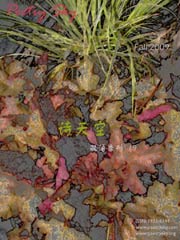 New to NewPages, Poetry Skyis the first bilingual poetry website in the world publishing both English and Chinese versions of contemporary Chinese, American and English poetry. It is a professional platform for the poetic exchange between Chinese, American and English poets. Its columns include Poetry Sky, Interviews, Critics’ Column and a forum to develop and exchange ideas or share views, etc. Poetry Sky publishes poems in both English and Chinese, while Interviews, Critics’ Column and Forum are available in either language.
New to NewPages, Poetry Skyis the first bilingual poetry website in the world publishing both English and Chinese versions of contemporary Chinese, American and English poetry. It is a professional platform for the poetic exchange between Chinese, American and English poets. Its columns include Poetry Sky, Interviews, Critics’ Column and a forum to develop and exchange ideas or share views, etc. Poetry Sky publishes poems in both English and Chinese, while Interviews, Critics’ Column and Forum are available in either language.
Poetry Sky is published every 15th in February, May, August and November. Submissions are accepted from August 16, 2009 to October 15, 2009 for the 20th issue — Winter 2009 issue. Poems published in Poetry Sky will possibly be included in their annual anthology.
In addition, Poetry Sky seeks contributing editors. As a contributing editor, you will have the opportunity to present your work and network with a growing community of poets (writers).
New Lit on the Block :: Mannequin Envy
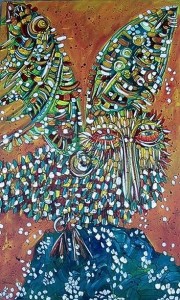 Summer 2009 is the second issue of Mannequin Envy, an online quarterly journal of poetic and visual arts staffed by Jennifer VanBuren: editor in chief, webmistress; Jai Britton: flash fiction editor; Patrick Carrington: poetry editor; and Alex Nodopaka: visual arts editor.
Summer 2009 is the second issue of Mannequin Envy, an online quarterly journal of poetic and visual arts staffed by Jennifer VanBuren: editor in chief, webmistress; Jai Britton: flash fiction editor; Patrick Carrington: poetry editor; and Alex Nodopaka: visual arts editor.
Available as a PDF, the Summer 2009 issue includes poetry and flash fiction by Abha Iyengar, Alison Eastley, Barton Smock, Bridget Gage-Dixon, Charles Reis, Cheryl Snell, Daniel Crocker, David Jordan, David Lawrence, Dennis Mahagin, Doug Ramspeck, Henry Louis Shifrin, John Sweet, Kathryn Jacobs, Lois P. Jones, Margaret Babbott, Mather Schneider, Richard Lighthouse, Roger Pfingston, Roy Lewis, Simon Perchik, Tim Kahl, and Tony Leuzzi. Julie Steinerand Don Shaeffer are the featured artists, and Julie Steiner is interviewed by Alex Nodopaka.
Mannequin Envy accepts submissions year round, but reads only in the month prior to publication (Sept 1 was their last reading deadline).
Novel-T
What if your heroes are found in the bookstore instead of the ballpark? What if books are your game?
Novel-T offers an opportunity to express your support for the all-stars of literature. For those who feel a connection to certain writers or characters – be it Walt Whitman’s expansive exultations, Huck Finn’s mischievous morality, or Bartleby’s inscrutable insubordination – these super-soft, jersey-style tees are the way to “wear your read.”
The first “team” of nine players, representing a selection of writers and characters from the American literary canon, will take the field for the first time at the official Novel-T launch on 9.20.09 at Freebird Books in Brooklyn. New teams, featuring an increasing roster of domestic and foreign players, will join the Novel-T Word Series league shortly.
To help ensure that there will always be new names to add to the Novel-T line-up, Novel-T donates $1 of the purchase price of each shirt to 826NYC, a nonprofit organization dedicated to supporting students ages 6 to 18 with their creative and expository writing skills.
Why the Anonymity?
A recent issue of interest has been the growing number of editors and publishers of online and print magazines keeping themselves “anonymous.”
Quite frankly, we’re finding this to be a more disturbing trend than not for a number of reasons.
One of the first is that blatant anonymity makes us suspect of the publication, of its validity and credibility.
When considering publications to list on NewPages, one of our minimal requirements is that there has to be an identifiable person who is willing to take responsibility for the finished product. Not being able to know the name of someone to contact if there is a problem, a question, or a concern makes the whole venture seem shady and fly-by-nightish. It’s one thing when no one identifies themselves on the web site, but when we write and ask for a contact, purely for our in-house information, and are denied this – we don’t feel this is a publication NewPages can recommend to our readers.
In the past, our readers have turned to us for help when they had concerns about such matters as how a contest was being run, when they could not get a reply on submissions, or even when their subscription stropped showing up and they could not contact the publisher. In these situations, we have contacted the publication and in most all cases, helped to resolve the situation. Not knowing who someone is does not help to create a working relationship, nor does it seem terribly collegial in the sense of literary community. In fact, it seems quite the opposite, which is exactly what it seems some publications mean to project.
If I had a dime for every time lit mags professed “we don’t want names to matter” and “we’re out to be different from the establishment”… Really, this is a highly cynical position to take against the many good, decent publications out there that indeed have had and currently have people working for them who are ethical, respectful, and concerned about the welfare of literature and publishing. This idea that keeping editors anonymous is the more ethical and just way to run a publication seems to call a lot of great work done by others corrupt.
Checking the backgrounds of those associated with the numerous new publications that crop up weekly is an effort that we make on behalf of our readers. Of course, as the saying goes, anyone can be a dog on the Internet, but we do look at names and attempt to verify these for any publications we list in our guides. We have always attempted to run NewPages as a site which recommends quality publications; we are not a clearinghouse of anything and everything out there – and our readers tell us they appreciate this about our site. If anything, anonymity in publications that claim high ethical standards give us an opposite opinion and raise many other questions: Are the editors publishing themselves? Are they publishing their friends? Honestly, how are we to know?
In terms of editorial credibility, it is helpful for writers as they are looking for places to submit their work to know the background of the people not only making the selections of the work, but who might also be editing their words. Certainly, there will be some people so eager for publication that it doesn’t matter to them, but I would like to know that my work will be given critical consideration – not turned away because it might have been too obscure for Mr. Smith’s eleventh grade class to understand, or, worse yet, published with errors I may have missed and Bill & Ted on their excellent publishing adventure really didn’t know enough to correct. I think most writers consider editors their “peers” in some way – at least in the sense that they will help a writer to grow through both acceptance and rejection and not allow their writing to make a fool of either writer or publication once it’s published.
At the professional level, the anonymous stance seems an immature one. I don’t know of any anonymous publication that has had any longevity. I can’t help but say it seems like a “youthful” attitude of self-righteousness and indignation – and one that won’t last long for any publication. Though I could be wrong – I’ll check back with some of you anonymous folks ten years from now – heck, five years from now, and we’ll see if you’re still around – or rather, if your publication is still around.
I have to ask about any writer submitting to an anonymous publication. Is this something to list on your publishing credentials? Is there any scrutiny of that? Again, I certainly do understand that for some people, this is not a concern, but I’m focusing on what we’re choosing to list here on NewPages and what our readers expect of what they’ll find here (aka our work).
I know at the higher professional levels, to list publications on our accomplishments, those publications have to have a verifiable editorial or peer review process. So, as much as I might admire the work I see on an anonymous publication, I can’t send in my work if I later want it considered for, oh, I don’t know, say a job I’m applying for, or promotion, or tenure. In fact, I recently reviewed an applicant’s resume and called into question two of the publications listed. I don’t think this would necessarily cost the applicant the job, but in some cases where this could make the difference, I think writers need to be careful about using such publications to bolster their credentials. Interestingly enough, in each of the anonymous publications I have seen so far, contributors include bios which list their publishing credentials. Slightly hypocritical, if names don’t matter – ?
Ultimately, it seems to me these spirited, young, anonymous publications are quickly finding their way around – mostly online – and if writers want to submit to them – for fun – they should by all means go ahead and do so. But as quickly as these efforts are sprouting up, they will also find their anonymous editors moving along to greener, more name-worthy publications. Ultimately, this is as any venture in life – user beware. I can’t think of too many situations in which I would engage in a working relationship with someone who insisted on remaining anonymous, though this might just be yet another of the web-future trends of publishing.
As for now – NewPages is not listing publications who insist on remaining anonymous. We have had long discussions about this, both in-house and with publications whose editors both have made themselves known to us and those who refuse to do so. We will continue to attempt to come to some understanding of this new phenomenon, but for now, we’ve had to make this a deciding factor in listings for our guides.
Poet-Bot Cartoons
I’m not allowed to post one without paying for it, so a link will have to suffice: Poet-Bot Cartoons on Savage Chicken.
Sidney: Booktown, BC
Literary mania is a year-round preoccupation in Sidney, a seaside town of 11,000 people, who live about 30 kilometres from British Columbia’s capital Victoria. Wherever you are, there’s a store on the next block. There’s one next door. There’s another a few doors down. And there’s one around the corner. There’s even one underground. There are 30 bookstores in all. Booktown? That’s an understatement. Read more about the experience from Steve Quinn.
Barrelhouse Remembers Swayze
 To celebrate the life and sometimes brilliantly bizarre work of Patrick Swayze, Barrelhouse has assembled all the responses to The Swayze Question: “For the past five years, Barrelhouse has ended every interview with the same question: what is your favorite Patrick Swayze movie? We’ve asked The Swayze Question, quite literally, to anybody who would talk to us, everyone from Emmylou Harris to Ian MacKaye to Malcolm Gladwell to the Hold Steady.
To celebrate the life and sometimes brilliantly bizarre work of Patrick Swayze, Barrelhouse has assembled all the responses to The Swayze Question: “For the past five years, Barrelhouse has ended every interview with the same question: what is your favorite Patrick Swayze movie? We’ve asked The Swayze Question, quite literally, to anybody who would talk to us, everyone from Emmylou Harris to Ian MacKaye to Malcolm Gladwell to the Hold Steady.
“What’s your favorite Patrick Swayze movie? Is it a low-budget trucking action thriller? A big budget romantic escape with class warfare undertones? An indie drama about a disturbed kid who sees visions of a giant bunny rabbit? The one where he’s a doctor in India, who is kind of bathed in white light the entire time? The one where he’s a high school jock fighting the communists? See, that’s the thing about the Swayze Question: whatever your answer, it reveals a lot more about you than it does about Patrick Swayze.
“He’s been kind of our patron saint, so this seemed like the best possible memorial.” -Dave Housley
Firth Earns Award
The award goes to the actor, Colin Firth, but the source material is from a novel by Christopher Isherwood and the subject is gay literature academic George Falconer. The film: A Single Man, directed, in his film debut, by fashion designer Tom Ford.
Bad Review? You Decide
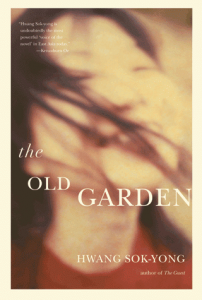 John Thorton writes: Seven Stories Press is serializing the first 62 pages of the English translation of Hwang Sok-yong’s The Old Garden, his 2000 novel and winner of the Danjae Award and Yi Literary Award in South Korea.
John Thorton writes: Seven Stories Press is serializing the first 62 pages of the English translation of Hwang Sok-yong’s The Old Garden, his 2000 novel and winner of the Danjae Award and Yi Literary Award in South Korea.
The novel’s central character is political prisoner Oh Hyun Woo, who is released after eighteen years to find that his world has completely changed and that the woman he loved has died. He returns to the house they shared briefly while both were involved in the radical resistance movement to South Korea’s military rule and there discovers her notebooks, through which he relives his life through her eyes.
The book received a strongly negative review by B.H. Myers in the New York Times Book Review, and the publisher hopes that by offering a substantial portion of the novel online for free, readers will be able to make up their own minds about this central work from the author Kenzaburo Oe called “undoubtedly the most powerful voice of the novel in East Asia.”
College for $99 a Month
“The next generation of online education could be great for students — and catastrophic for universities.” Story by Kevin Carey on Washington Monthly.
Old Lit Back on the Block :: Red Line Blues
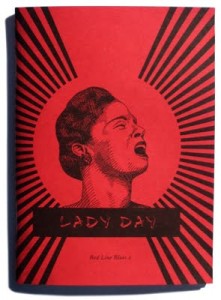 It’s nice to see a publication find their way back after one of those short breaks that often become permanent. Red Line Blues, a theme-based journal from Brooklyn, NY and Asheville, NC is back from their hiatus.
It’s nice to see a publication find their way back after one of those short breaks that often become permanent. Red Line Blues, a theme-based journal from Brooklyn, NY and Asheville, NC is back from their hiatus.
From the Red Line Blues Crew (Moriah Norris-Hale, Erich Nagler, and Benjamin Yanes): “We’ve been on hiatus for the past few months (ok, perhaps a year) renovating barns, traveling to Finland and back, and weathering the ole recesh’. We’re stoked to be back in the saddle and hope you’ll join us for issue #7.”
The upcoming theme for the issue is “Lean Times”: “Now that a full year’s limped by since Lehman went belly up, we’re marking the era with the theme ‘Lean Times.’ We’re casting the net for prose, poetry, photos, prints, drawings, and songs that illuminate our recent [in]securities, and tell the tales of staying afloat in the downturn. All submissions are due by Halloween, 2009 (Saturday, October 31st).”
See their website for further details.
Jobs :: Various
The English Department of Willamette University invites applications for the tenure-track Hallie Brown Ford Chair in Writing. Review begins November 9. Online Application Form
The University of Nevada, Reno Department of English announces an entry-level, tenure-track position in creative writing, with a specialization in poetry. Oct 29
Penn State York invites applications for an Assistant Professor of English (tenure-track, 36 weeks). Dr. Joseph McCormick, Director of Academic Affairs. Review begins November 10.
University of San Diego Assistant Professor of English in Creative Writing, specializaiton: fiction writing. Sr. Mary Hotz, Chair, Creative Writing Search Committee, Department of English. Nov 1
Miami University (Oxford, OH) Assistant Professor in British poetry of the Romantic period. J. Kerry Powell, Chair, Department of English. Screening begins immediately until Oct. 31.
For appointment beginning in the fall of 2010, The George Washington University seeks a writer of creative non-fiction to teach two semesters at as the Jenny McKean Moore Writer-in-Washington. Nov 1
Cleveland State University Assistant Professor – Creative Writing (Fiction). David Larson, English Department. Nov 2
The Amherst College Department of English invites applications for a tenure-track assistant professor (beginning or advanced) specializing in medieval literature, in particular, medieval poetry taught in the original language. Nov 1
The Amherst College Creative Writing Program invites applications from fiction writers for the position of Visiting Writer, to begin July 2010. Nov 15
Educational Center for the Arts, CT. Writer in Residence in fiction and/or poetry sought to teach in New Haven, part-time, on Mon and Tues afternoons from 1-4:00 in the Creative Writing Dept. in a high school for the arts for gifted students. Compensation includes five hours prep time and five hours teaching time. Students are highly motivated and graduate to pursue further study at NYU, Barnard, Columbia, Wesleyan, Sarah Lawrence, etc. Please email crosenstone_at_snet_dot_net immediately if interested.
Narrative Poetry Prize Winners Announced
Narrativehas announced the winners of their 2009 Poetry Prize contest:
First Prize: Alice Jones, “Spell”
Second Prize: Anne Marie Rooney, “After It”
Third Prize: Tom
Open Book Co-op to Open Store
While we are sorrow to hear of bookstores closing, it’s great news to hear of a new one opening. The Open Book co-operative has signed a one-year lease to take over a former Harry Schwartz bookstore space on Oakland Avenue in Shorewood, WI. A spokesperson for Open Book says “we’re about halfway there” in raising the money needed to actually open a store. They have raised about $50,000, and are hoping supporters will come forward and donate and/or purchase memberships to help raise the remainder.
DV and Women’s Health Publisher
From the Volcano Press website, Adam Gottstein, Publisher and Ruth Gottstein, Publisher Emerita:
Volcano Press has been publishing books on domestic violence and women’s health for forty years.
Forty years ago, the domestic violence movement consisted of a handful of grass-roots shelters, struggling to survive.
And yet the struggle to end domestic violence is still a movement. Although today there is the federally funded Violence Against Women Act (authored by Senator Joe Biden), and many dedicated community agencies, activists, counselors, attorneys, law enforcement, and caring families and friends, there is still a long way to go.
We are living in a time of violence. “33 MILLION is the number of U.S. adults–representing 15% of the population–who say they have been victims of domestic violence.” (Source: Harris Poll)
If we can develop tools and understanding to effectively stop intimate violence, perhaps we can develop tools and understanding to end all violence in our time.
Towards this goal, we continue to pledge our allegiance. We hope that the Volcano Press books you see listed here will be of assistance. You will note that we are now making available some fine books and pamphlets from other publishers, and plan to add more as we learn about them.
Free Libraries Close in Philly
And so it begins…
All Free Library of Philadelphia Branch, Regional and Central Libraries Closed
“We deeply regret to inform you that without the necessary budgetary legislation by the State Legislature in Harrisburg, the City of Philadelphia will not have the funds to operate our neighborhood branch libraries, regional libraries, or the Parkway Central Library after October 2, 2009.”
Man Booker Shortlist Announced
The six finalists for the Man Booker Prize have been named. A winner will be named in October.
A S Byatt, The Children’s Book (Chatto and Windus)
J M Coetzee, Summertime (Harvill Secker)
Adam Foulds, The Quickening Maze (Jonathan Cape)
Hilary Mantel, Wolf Hall (Fourth Estate)
Simon Mawer, The Glass Room (Little Brown UK)
Sarah Waters, The Little Stranger (Virago)
New HBO Series Based on Book
Martin Scorcese will direct the pilot of a new 2010 HBO series Boardwalk Empire based on the novel by Nelson Johnson. Aside from Mad Men, I don’t watch series television, but I’m going to have to give this one a try: “The series stars Steve Buscemi as Nucky Thompson, a Prohibition-era bootlegger and prominent figure in the Atlantic City of the early 1920s, someone who’s described as “equal parts politician and gangster.” Kelly Macdonald (“No Country for Old Men”), Michael Pitt (“The Village”), Michael Kenneth Williams (“The Wire”), Michael Shannon (“Revolutionary Road”) and Dabney Coleman also star.”
ASF Contest Winners
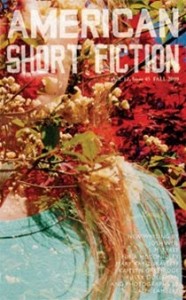 The newest issue of American Short Fiction (Fall 2009) includes the first- and second-place winners of their inaugural American Short(er) Fiction Prize:
The newest issue of American Short Fiction (Fall 2009) includes the first- and second-place winners of their inaugural American Short(er) Fiction Prize:
First Place: Mary Kay Zuravleff “The Things They Paid For”
Second Place: Kaitlyn Greenidge “The Innocent”
College Lit General Issue
The Summer 2009 issue of College Literature is another of their “General Issues” which includes a wide range of articles helpful for both college and university teachers. This issue includes the essays “‘Bodied Forth in Words’: Sylvia Plath’s Ecopoetics” (Scott Knickerbocker), “The Orients of Gertrude Stein” (Josephine Nock-Hee Park), “The Postcolonial Orphan’s Autobiography: Authoring the Self in Jamaica Kincaid’s Mr. Potter and Calixthe Beyala’s La Petite fille du reverbere” (Julian Everett), “Speakers and Sleepers: Chang-rae Lee’s Native Speaker, Whitman, and the Performance of Americanness” (Christian Moraru), “Pride and Prestige: Jane Austen and the Professions” (Alice Drum), “‘Other and More Terrible Evils’: Anticapitalist Rhetoric in Harriet Wilson’s Our Nig and Proslavery Propaganda” (David Dowling), “Shakespeare, Faulkner, and the Expression of the Tragic” (Duncan McColl Chesney), “‘Energetic Space’: The Experience of Literature and Learning” (Maria Takolander), “Prepreprofessionalism: Rankings, Rewards, and the Graduate Admissions Process” (Craig T. Fehrman). Also included are review essays and book reviews – a usefully packed professional quarterly journal.
Need a Fundraiser? Sell Coffee
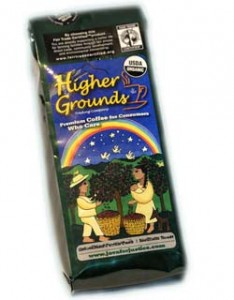 Here’s a simple fundraiser for your school groups, organizations, etc. – sell coffee! Higher Grounds is a great organization that does good work (organic, fair trade, sustainable, environmental), and wants to help others do the same. You can get the coffee wholesale from them and distribute it at your own price, keeping the difference for your fundraising. Not only is it simple, it’s delicious coffee to boot!
Here’s a simple fundraiser for your school groups, organizations, etc. – sell coffee! Higher Grounds is a great organization that does good work (organic, fair trade, sustainable, environmental), and wants to help others do the same. You can get the coffee wholesale from them and distribute it at your own price, keeping the difference for your fundraising. Not only is it simple, it’s delicious coffee to boot!
Rock and Books Together
The 46 Essential Rock Reads on LA Time Jacket Copy.
New South Contest Winners
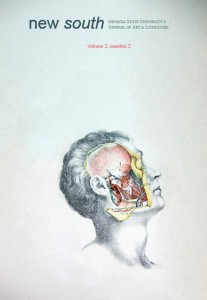 New South Spring/Summer 2009 includes the winners of their 2009 writing contest:
New South Spring/Summer 2009 includes the winners of their 2009 writing contest:
Poetry winners, judged by Chelsea Rathburn: Sarah Blackman, “Coriolis” and Maya Jewell Zeller, “Monroe Street: Route 24”
Fiction winners, judged by John Weir: Megan Mayhew Bergman, “The Cow That Milked Herself” and Liza Wieland, “Quickening”
Also a nod to Cara Blue Adams, former NewPages review writer, for publication of her stories “After I Slept With You But Before I Was Your Girlfriend” and “How to Marry Well” in this same issue.
Bye Bye Books
From the Boston.com:
“Cushing Academy has all the hallmarks of a New England prep school, with one exception. This year, after having amassed a collection of more than 20,000 books, officials at the pristine campus about 90 minutes west of Boston have decided the 144-year-old school no longer needs a traditional library. The academy’s administrators have decided to discard all their books and have given away half of what stocked their sprawling stacks – the classics, novels, poetry, biographies, tomes on every subject from the humanities to the sciences. The future, they believe, is digital.”
[Read the rest here.]
Tim Carmody takes a closer look at this “technology bump” – which he had tweeted as “not about technology or pedagogy but remodeling – and only accidentally the other things.” His commentary with reader feedback offers a much more in depth consideration of the effects of such decisions.
Dalkey Archive Fellowship Program Launched
Dalkey Archive Press has launched an innovative fellowship program at the University of Illinois with the first six fellows: four in Applied Translation and two in Literary Publishing. The program is part of a series of innovative educational programs that the Press has been developing over the past two years, in cooperation with the University’s Center for Translation Studies.
Funded in part through foundations and the University of Illinois, Dalkey Archive’s fellowship program is designed to offer unique opportunities for young people to develop as translators, publishers, and literary advocates. The Applied Translation program was created in response to the need on a national and international level for providing practical experience to young literary translators. As part of the program, each fellow will translate a complete book to be published by Dalkey Archive Press by the end of their fellowship year.
The 2009 fellows in the Applied Translation are: Rhett Warren McNeil (USA), Ursula Meany Scott (Ireland), Jamie Richards (USA), Kerri Pierce (USA).
The Literary Publishing fellowship program is designed to offer young people an opportunity to gain experience in the publishing industry while working full-time at Dalkey Archive Press. The 2009-2010 fellows for Literary Publishing are: Stephen Sparks (USA) and Shir Alon (Israel).
For more information on Dalkey Archive’s fellowships programs, contact Martin Riker: riker_atdalkeyarchive_dot_com
Marion Kingston Stocking Honored
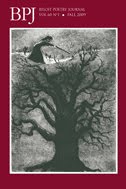 The fall issue of Beloit Poetry Journal includes two beautiful entries (both available full text online) in remembrance and honor of Marion Kingston Stocking (June 4, 1922-May 12, 2009), former editor and guardian angel of the publication.
The fall issue of Beloit Poetry Journal includes two beautiful entries (both available full text online) in remembrance and honor of Marion Kingston Stocking (June 4, 1922-May 12, 2009), former editor and guardian angel of the publication.
The first piece, which is available in full-text on the BPJ website, is “Letter to Herself at Twenty-Eight: Diary Excerpts, New Year’s Eve, 1940.” Marion recounts how “the world is in a pretty awful mess…America is arming at top speed. A draft has been ordered, & every week more men are poured into the Army. I hope you are living in a world at peace, with no race our country prejudice.” Her words carry an amazing sense of hope for her world and encouragement for her place in it: “You were born to stand on hilltops with the wind blowing stars through your hair. Never forget it.” It is all incredibly heartfelt, thoughtful, and just downright sweet.
The second piece is a collective editor’s note from John Rosenwald and Lee Sharkey – and perhaps a few others who had a hand in it as well. It’s a beautifully renedered history of Marion’s work with BPJ, the influences she and her husband David had on the publication and the people who were a part of it, and the influence and traditions of hers that still remain with BPJ. Thank you John and Lee for this.
Many others contributed tributes to Marion, a sampling for which BPJ has created a page here.
eReaders Better than Paper?
“A recent study from Cleantech finds that e-readers could have a major impact on improving the sustainability and environmental impact on the publishing industry, one of the world’s most polluting sectors. In 2008, the U.S. book and newspaper industries combined resulted in the harvesting of 125 million trees, not to mention wastewater that was produced or its massive carbon footprint.”
AQR All-Prose Issue
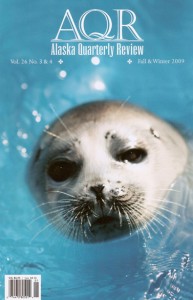 Nothing against poetry, but the newest issue of Alaska Quarterly Review (Fall & Winter 2009) is an all-prose issue – with fiction and nonfiction only. The full table of contents is available on their website.
Nothing against poetry, but the newest issue of Alaska Quarterly Review (Fall & Winter 2009) is an all-prose issue – with fiction and nonfiction only. The full table of contents is available on their website.
New Lit on the Block :: Lung
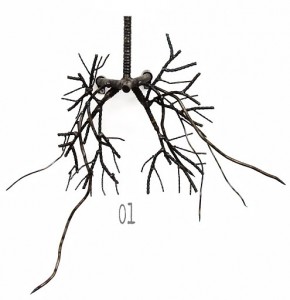 Edited by screenwriter and poet Alveraz Ricardez, Lung is an “independent peddler of unique voices in contemporary poetry.” Lung is available free online using Issuu, and is currently accepting submissions for its second publication until October 5th.
Edited by screenwriter and poet Alveraz Ricardez, Lung is an “independent peddler of unique voices in contemporary poetry.” Lung is available free online using Issuu, and is currently accepting submissions for its second publication until October 5th.
The first issue of Lung features writers whose works met the submission criteria of ‘invoking emotion but avoiding the trappings of mediocrity’ of being ‘fresh, innovative voices that have something original to say,’ and moreover being ‘unique’ and ‘jumping off the page’: Cristin O’Keefe Aptowicz, Cyril Wong, Olivia Tandon, Gabriel Ramos-Rocchio, Sandy Benitez, Nina Romano, Christopher Mulrooney, Aleathia Drehmer , Rei Thompson, J. Bradley, M.J. Hamada, Christopher Woods, Nina Ki, J. Michael Wahlgren, Janann Dawkins, Steve Meador, Derek Richards, David McIntire, and Alex Galper.
CFP Cultures of Recession
An Interdisciplinary Graduate Student Conference Hosted by The Program in Literature
Duke University
November 20 & 21, 2009
NEW DEADLINE: September 15, 2009
UPDATE: Travel support is now available for some presenters due to generous support from the Duke University Center for International Studies, with priority for international speakers.
Keynote Speaker: Stanley Aronowitz (CUNY), author of How Class Works and Just Around The Corner: The Paradox of a Jobless Recovery
Around 5:00 AM on Nov. 28—the day after Thanksgiving—a Wal-Mart employee was trampled to death by shoppers eager to participate in the store’s annual “Black Friday” sales blitz. On Dec. 1, after three months of violent upheaval in the banking sector, the National Bureau of Economic Research announced that the U.S. had been in economic recession for almost a year. On Dec. 5, a group of mostly Hispanic workers staged a sit-in at Republic Windows and Doors after being laid off from the Chicago-based factory with only three days’ notice. Throughout mid-December 2008, critics lauded the “tightness” and “economy” of Kelly Reichardt’s Wendy and Lucy, an 80-minute long independent film featuring a young woman, a dog, the Pacific Northwest, and not much else. Meanwhile, the country of Iceland—designated a terrorist state by Britain in an effort to freeze some of its assets—has declared bankruptcy. Widespread economic and institutional breakdown has resulted in a new wave of urban radicalism spreading across Greece, France, Italy, Spain, and the U.K. In China, mass deprivation and joblessness riots have escalated as authorities struggle to prop up a falling GDP. Despite unprecedented bailout and stimulus spending by the Bush and Obama administrations, the U.S. stock market has receded to levels last seen in 1997, with the unemployment rate crossing 10% in some states.
This conference invites graduate students from humanities and social science disciplines to think about how the idea and experience of recession—a sustained national or global-economic downturn that makes itself visible through declines in industrial production, employment, sales, and income—frames the cultural life and livelihood of affected communities, places, and governing bodies. This shift in communal and political makeup opens space for discussion about the impact of recession on cultural forms. What sort of cultural phenomena—artistic, political, or otherwise—find expression during times of recession? Are there features of recession that seem to transcend history or geography? Are certain socioeconomic climates more or less poised to give birth to recession—and what sort of political positionalities or modes of thought find themselves competing to “solve” recessive crises? How does recession change the parameters of social and political institutions? Within the governing structure, how do power dynamics shuffle as blame is distributed between institutions and people? How might the idea of recession compare to related concepts like depression, inflation, deflation, unemployment, crisis, or overproduction? Can we identify specific literary or artistic forms, motifs, and icons that emerge during times of recession?
Possible panel or paper topics
• Recession and cultures of work
• Recession and the global economy
• Recession and the language of loss, failure, or decline
• Recession and establishment discourse
• Recession, labor struggle, and “class warfare”
• Recession and the banking-sector bailout
• Recession and debt
• Recession and the politics of greed or waste
• Recession, crisis theory, and the logic of capital
• Recession and radical political resurgences
• Recession and nostalgia
• Recession and consumer culture
• Historical recessions: the post-war ‘40s, the 1970s, Japan’s Lost Decade, etc.
• Recession in an age of Facebook, blogs, and “instant” information
• Recession and cultural production
• Recession and the politics of religion
• Recession and the politics of race, gender, and/or sexuality
• Recession and environmental/energy crises
• Recession and the university
Please send a 250-500 word abstract to culturesofrecession_at_gmail_dot_com by September 15, 2009.
ORGANIZERS
Sara Appel
Gerry Canavan
Alex Greenberg
Lisa Klarr
Ryan Vu
Glimmer Train Anounces Contest Winners – 2009
Glimmer Train has just selected the 50 winning entries for their first Best Start competition. Each wins $50 and makes Glimmer Train’s Best Start list. This competition is held quarterly and is open only to writers whose fiction has not appeared in a print publication with a circulation over 3000. Each submission should be an engaging, coherent narrative, but does not need to be a complete story, just an important part of a story in progress. Word count: under 1000. Their next Best Start competition will take place in September.
Glimmer Train has also chosen the winning stories for their June Fiction Open competition. This competition is held quarterly and is open to all writers for stories with a word count range between 2000-20,000. No theme restrictions. Their monthly submission calendar may be viewed here.
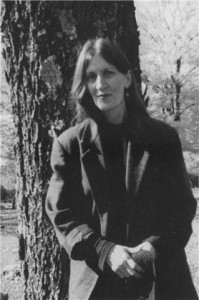 First place: Ingrid Hill (pictured) of Iowa City, IA, wins $2000 for “Pavilion.” Her story will be published in the Fall 2010 issue of Glimmer Train Stories, out in August 2010.
First place: Ingrid Hill (pictured) of Iowa City, IA, wins $2000 for “Pavilion.” Her story will be published in the Fall 2010 issue of Glimmer Train Stories, out in August 2010.
Second place: Adam Theron-Lee Rensch of Bronxville, NY, wins $1000 for “A Day in the Life.” His story will also be published in an upcoming issue of Glimmer Train Stories.
Third place: Sam Ruddick of Brighton, MA, wins $600 for “Flight.”
A PDF of the Top 25 winners can be found here.
Glimmer Train as the following upcoming contest deadlines:
August Short Story Award for New Writers: August 31
This competition is held quarterly and is open to writers whose fiction has not appeared in a print publication with a circulation over 5000. No theme restrictions. Word count range: 500-12,000.
Subscribe, Support, So Easy
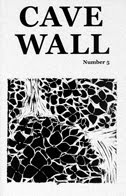 A recent note from Rhett Rhett Iseman Trull, Editor of Cave Wall, journal of poetry, is a good reminder of the importance of subscribing to literary magazines as a way to get great reading material in your hands, but also to help support these endeavors. It’s a tough time for us all, but collectively, subscriptions really can make a difference in helping mags through the year.
A recent note from Rhett Rhett Iseman Trull, Editor of Cave Wall, journal of poetry, is a good reminder of the importance of subscribing to literary magazines as a way to get great reading material in your hands, but also to help support these endeavors. It’s a tough time for us all, but collectively, subscriptions really can make a difference in helping mags through the year.
If you don’t already, take the step and subscribe to a couple. If you don’t “need” or want any more lit mags, then get a subscription for a friend, for your local library, elder care home, domestive violence shelter, juvie detention center, runaway home, high school creative writing class, prison, alternative high school, church – be creative! There are lots of organizations and groups that would probably really appreciate having good reading.
Even better – teachers! – get your students to subscribe as required reading – either to one specific journal for the whole class, or let them browse the NewPages list and pick one of their own choice. There are many creative ways to work with these in the classroom. Ordering a set of backcopies is also a quick and easy way to get the whole class on the same page. I’ve always had good luck with our bookstore ordering from small lit mags, and sometimes have ordered them myself and collected the money from my students. Do what you can to get students reading and keep these great publications going!
From Rhett: “There has never been a better time to subscribe to Cave Wall than this month, during our September 2009 Back Issue Sale, where current and new subscribers can purchase back issues 1-5 for just $4 each. If you have been wanting to subscribe, or if your subscription has lapsed and you missed a few issues, now is a great time to act. Also, with the holidays approaching, what better gift for a poetry lover than a complete set of Cave Wall back issues? In these difficult economic times, Cave Wall appreciates your support more than ever.”
The Graceful Envelope
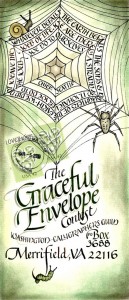 The Graceful Envelope Contest is sponsored by the National Association of Letter Carriers and administered by the Washington Calligraphers Guild.
The Graceful Envelope Contest is sponsored by the National Association of Letter Carriers and administered by the Washington Calligraphers Guild.
This year’s theme was Address the Environment. Entrants were urged to design an envelope that promotes the preservation of our natural world and address it artistically. A trio of judges looked for skill in lettering, effective use of color and design, and creative interpretation of the theme.
This year, close to 150 entries were received; 12 were selected as “Winners” and 18 were given the distinction “Honorable Mention” in the contest’s adult division. The judges also selected student winners from 250 entries in the junior and children’s divisions.
Visit the website to see all of the winning entries from this year as well as an archive of winners from years past.
[Pictured: Best in Show winning entry by Gerry Jackson Kerdok]
Carl Sandburg Residency
Having been to this historic home, I can say with certainty that this is an idyllic location for a residency.
Carl Sandburg Writing Residency
Mrs. Paula Sandburg first generated the idea of a writer-in-resident at Connemara when her family’s North Carolina home became a unit of the National Park Service shortly after her husband’s death in 1968. Carl Sandburg Home National Historic Site is pleased to host its first Writer-in-Residence Program in March 2010.
This program offers poets an opportunity to live and work at Carl Sandburg Home National Historic Site. The three-week residency is scheduled for March 2010. Housing is offered in an historic cottage near the Sandburg Home, with a studio and stipend provided.
As part of the program, writers will be required to do two public programs, the first a short fifteen-minute presentation describing their work during a welcome reception. The second will be an outreach program to an audience of the writer’s choice. Writers must also donate one original piece of their work to the park’s permanent museum collection, copyrights will remain with the writer.
The deadline for submissions is October 15,2009. Selection for the 2010 residency will be announced during the second week of December 2009.
This program is made possible through support from the Friends of Carl Sandburg at Connemara.
New Lit on the Block :: Black Market Review (UK)
The Black Market Review (annual) is edited exclusively by Creative Writing undergraduate and postgraduate students at Edge Hill University. BMR publishes poetry, fiction and creative nonfiction, translations, art/photography, reviews and interviews.
This first issue is an enormous effort – with nearly two dozen staff members working on the variety of content. It is dedicated to Lisa Ratcliffe, who was a student at EHU and who it appears passed away in February from some type of cancer. Robert Sheppard writes a piece in tribute to her, and the issue itself includes a fiction piece written by Lisa, “Las Cartas.” There’s also a link to her blog, which is tough but touching read of her final weeks.
BMR also features the following authors and artists: Robert Sheppard, James Reidel, Kimberly Johnson, Rupert Loydell, Nicholas Samaras, Galvin Selerie, C. E. Chaffin, Carol Parris Krauss, David Toms, Donal Mahoney, Felicia Zamora, Ginna Wilkerson, Rodrigo V. Dela Pe
New Lit on the Block :: Sunsets and Silencers
Sunsets and Silencers publishes short fiction, flash fiction, creative non-fiction, poetry, essays, paintings, photography, and comic strips as a platform for emerging and established artists to showcase their work. The online journal is a subsidary of Nexus print, a biannual literary, cultural, and art magazine published by NexusCreative, a non-profit public benefit organization interested in opening new and exciting channels for creative expression.
Behind the scenes at Sunsets and Silencers are Founder and Editor Chuckie Campbell, Poetry and Fiction Editors Sarah McCartt Jackson and Bryan Jackson, and “Readers and Contributers,” though plural, lists only Sam Meyer, so maybe there’s room for more here.
This first issue includes contirbutions of fiction, poetry, and various forms of art by Beth Couture, Pete Pazimo, Russell Helms, Peter Scwartz, Christian Ward, Stephen Mead, Christopher Woods, Patrick O’Neil, Ben Nardolilli, Melanie Griffith, Bobi Conn, Jessica McEuen, and Adam Shaw.
Sunsets and Silencers is accepting submissions, and indicates that “On promising work, we may offer feedback, even if the piece didn’t work for us. Please, keep in mind, however, that we do not respond to every piece, mostly because of the volume of submissions received. We want to provide exposure to artists and writers who create out of a restless fever, and who are fearless in their choice to submit.”
Narrative Spring Story Contest Winners
Narrative Spring Story Contest winners and finalists:
First Prize: Anthony Marra
Second Prize: Jane Delury
Third Prize: Paul Griner
Finalists: Alethea Black, Evan Christopher Burton, Vicky Grut, Jeff O’Keefe, Denise Morrissey, Jay Neugeboren, Mohan Sikka, Debra Spark, Jackie Thomas-Kennedy, Jill Widner
Narrative offers the following upcoming contests for writers:
The Fall 2009 Story Contest, with a First Prize of $3,250, a Second Prize of $1,500, a Third Prize of $750, and ten finalists receiving $100 each, is open to fiction and nonfiction entries from all writers. Deadline: November 30, 2009
The Narrative 30 Below Story Contest, with a First Prize of $1,500, a Second Prize of $750, a Third Prize of $300, and ten finalists receiving $100 each, is open to all artists and authors, ages eighteen to thirty. Deadline: October 29, 2009
New Lit on the Block :: Squid Quarterly
Squid Quarterly is an online journal of short fiction and prose poetry founded by Beth Couture and Jeff Tucker, both writers at the Center for Writers at the University of Southern Mississippi.
This first issue includes works by Kristen Eliason, Andrew Farkas, Rachel Furey, Darin Graber, Sarah Jenkins, Jen Marquardt, Tim Marsh, Michelle Nichols, Lance Olsen, Melanie Page, Leigh Phillips, Matthew Purdy, and Wendy Vardaman.
SQ is currently accepting submissions for their second issue. SQ nominates for the Pushcart Prize and plans to publish a print anthology of select works at the end of the year.
Jobs :: Various
Eastern Illinois University has a tenure-track position in Creative Writing to start Fall 2010. Dr. Dana Ringuette, English Department. Nov 6
The English Department of Willamette University invites applications for the tenure-track Hallie Brown Ford Chair in Writing. REview begins Nov 9.
The Department of English at CUNY’s Brooklyn College Assistant or Associate Professor of Poetry. Review begins Oct 21.
The American University of Sharjah, UAE seeks candidates for a Department Head for the Department of English as well as Department Head for the Department of Mass Communication for Spring 2010.
Shippensburg University Assistant Professor of Creative Writing—Fiction, tenure-track. Richard Zumkhawala-Cook, Chair. Review begins Nov 2.
Brooklyn College Assistant or Associate Professor of Poetry. Michael T. Hewitt, AVP for Human Resource Services. Review begins Oct 21.
George Mason University, tenure-track assistant professor of creative writing, poetry. William Miller, Chair/Search Committee. Review begins Oct 1.
Aspen Book Store to Close
Aspen Book Store in Little Nell will close September 8 for what owner John S. Edwards says are a variety of reasons, including his desire to spend more time reading after 20 years of bookselling. Happy reading John!
